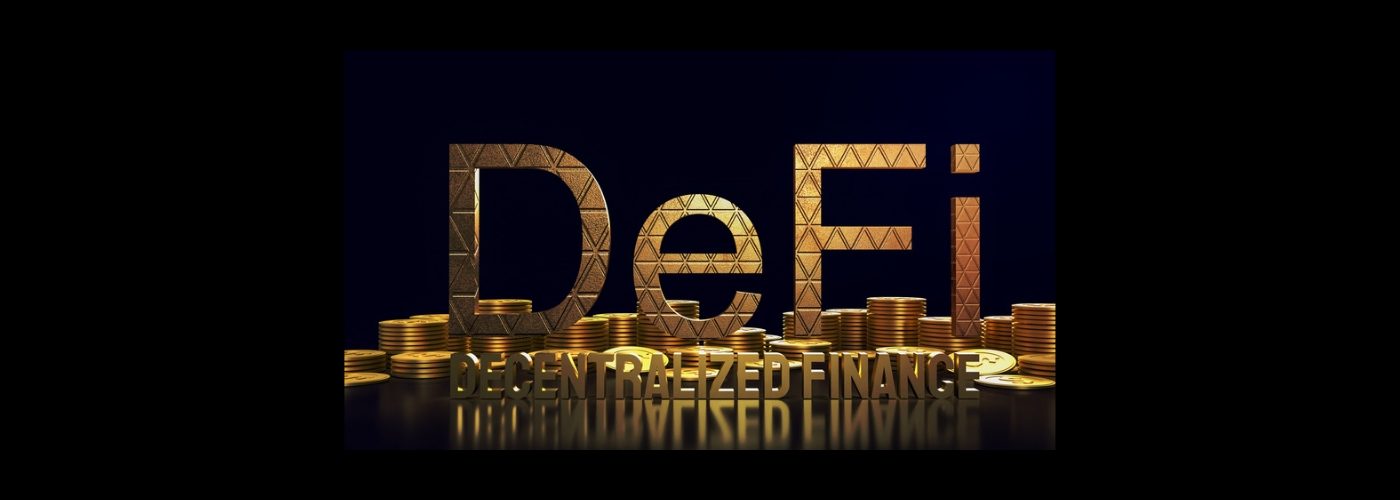What is DeFi? How does it work?

Description
DeFi (decentralized finance) is a financial system supported by decentralized and secure blockchain technology. More information about Bitcoin and blockchain can be found on the exex.com blog.
What is DeFi?
The history of decentralized finance is tied to the development of the cryptocurrency industry. Every year, cryptocurrencies are becoming increasingly popular among the population, and there are opinions that billions of people will use them within the next few decades. Decentralized finance (DeFi), or as it is also called decentralized finance, is financial instruments and applications based on blockchain technology. The main objective of decentralized finance is to become an alternative to centralized finance, i.e., the classical banking system.
What is DeFi from the point of view of existing banking structures? For them, DeFi is a direct competitor because it allows all users who cannot use the services of banks to do without them.

Centralized vs. decentralized finance
Centralized finance (CeFi), which includes centrally managed platforms and state central banks, offers customers the opportunity to obtain loans and invest in stocks and bonds. They also control the process of currency issuance and impose many requirements on users, thus restricting access to their financial instruments.
Centralized financial management controls customers' funds, which is their main disadvantage. However, centralized financial platforms offer more credit facilities and are easier to work with.
In turn, decentralized finance also offers loans, loans in their ecosystem. Each customer has the right to interact with them and manage with the help of dApps. Decentralized platforms that do not store customer data handle asset exchanges and loans. They also do not require verification procedures at this time.
The question may arise, but what is DeFi crypto in this ecosystem? These are digital coins and tokens offered to users by decentralized platforms. Some of the best-known include coins like UNI, AVAX, and others. The main advantage of decentralized finance is that buying and selling are done without intermediaries that could interfere with the process.
What is DeFi in cryptocurrency: how does DeFi work?
Decentralized finance is based on decentralized applications or decentralized protocols. What is a DeFi protocol?
It is a network based on cryptography, blockchain, and consensus methods. The network is structured around smart contracts. Creators of decentralized applications implement protocols that have open-source code for trading on exchanges.
If a customer wants a loan, he puts some coins on the deposit. When the loan expires, the borrower must repay the borrowed coins with a certain %. There are no transaction intermediaries, and smart contracts carry out the control.
Advantages and disadvantages of DeFi
Decentralized finance has a set of advantages:
- Transparent
- Decentralized
- Cross-border
- Interoperable.
The main advantage DeFi has is that they are decentralized. The question of whether DeFi is regulated can be answered unequivocally: no.
There is no centralized control structure; a smart contract is responsible for everything. Once the smart contract is up and running, decentralized applications operate with little or no interference.
The source codes of the decentralized applications are completely open for auditing. Each user can read the contract information and detect errors. Any of the transactions are pseudo-anonymous.
Almost all decentralized applications are cross-border, meaning all customers can access them.
Other advantages of DeFi include the fact that they are inclusive, meaning that each user can create and use applications. DeFi is also interoperable. This means it is possible to develop new applications by combining various decentralized products, from exchanges to prediction markets.
At the same time, decentralized finance also has some disadvantages. Unfortunately, the loans of decentralized finance are smaller when compared to traditional finance. If the underlying asset's price suddenly drops due to volatility, a complete application collapse is possible. In addition, the risk of smart contracts being hacked by cybercriminals and organized hacker groups remains. It's not uncommon for smart contracts to be written with errors in the code. These are the main drawbacks of DeFi.

The future of DeFi
Currently, trading volumes on decentralized platforms have grown to $62 billion. It's due to the bankruptcy of the FTX cryptocurrency exchange. The number of transactions on many decentralized platforms has increased several times. Nansen portal data shows that the protocols have recorded increased customer activity.
Despite problems with the FTX exchange, decentralized finance got a new impetus for its development. We can say that DeFi 2.0, which is the second generation of decentralized finance, will be able to solve their problems. They offer clients a more profitable use of capital, and they will activate mechanisms that stabilize liquidity.
Decentralized finance has already become one of the pillars of the cryptocurrency industry and the digital economy as a whole. New DeFi applications appear regularly, and their popularity will grow as regulators tighten their grip on centralized exchanges.
DeFi is, therefore, well positioned to attract more customers in the short to medium term as an integral part of the crypto world.
What is the total value fixed in DeFi?
Last year in November 2021, the total locked-in value (TVL) in DeFi was over $253 billion. In February 2022, it was already $178 billion.
Amid the collapse of the FTX exchange, the number of transactions in decentralized finance has increased several times, as indicated earlier. And at the end of 2022, TVL may exceed that figure.

DeFi decentralized finance in the Philippines
Decentralized finance provides a great opportunity for cryptocurrency development in the Philippines. It is a developed system of the free circulation of cryptocurrencies, which helps in many ways to understand the industry and use it without fear or restrictions. It will always remain important for a resident of the Philippines to have his or her own money management and to really appreciate the benefits of DeFi in the country:
- Transparency of decentralized finance applications, accessible and honest auditing;
- The use of DeFi to launch a product for any project, tokenization of businesses and services in the Philippines;
- Decentralization, namely the ability to transact between users using multiple computers of other participants, such as distributed between Maynila, Dabaw, and San Fernando;
- Independence from the human factor, creating processes based on the automated settlement of smart contracts.
Conclusion
In summary, decentralized finance allows all users to benefit from financial services. Also, anyone can create a decentralized app. You don't have to have specific knowledge to understand the structure of DeFi. An introduction to DeFi can be found on many educational resources. You can find topics related to decentralized finance on them.
DeFi has become increasingly in demand in the market right now, especially after the fall of the FTX exchange. In short to medium term, we can expect to see more DeFi 2.0 decentralized marketplaces offering various financial services to customers.



